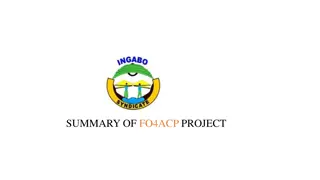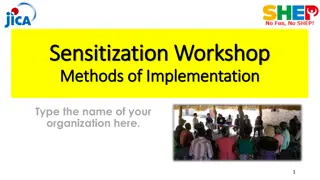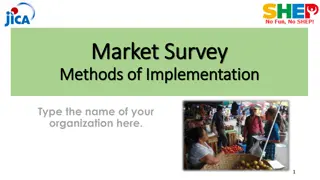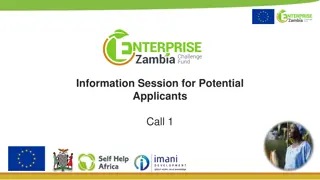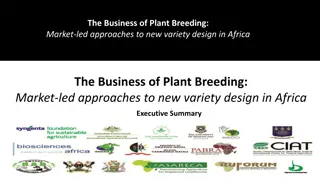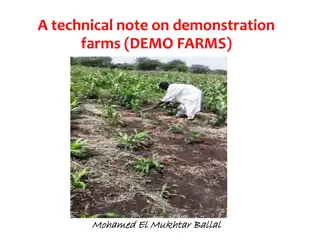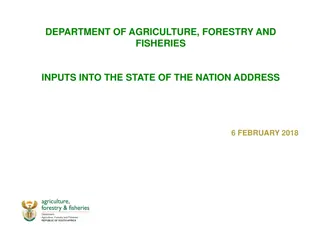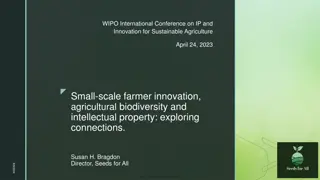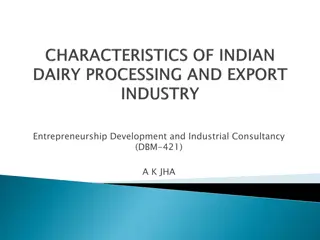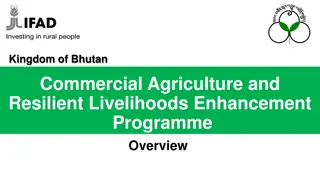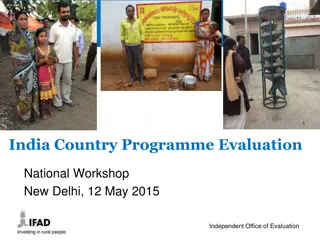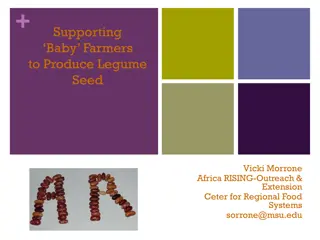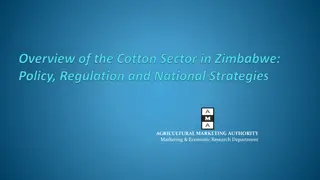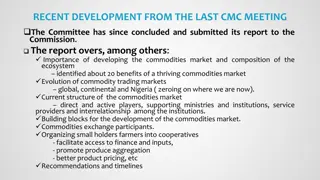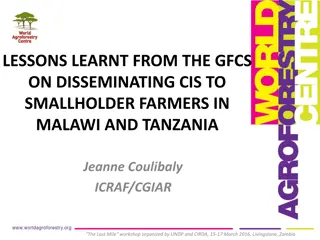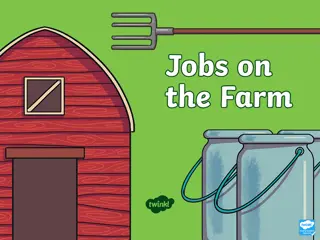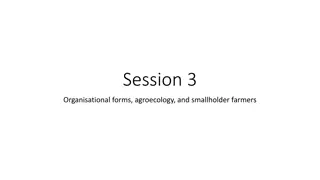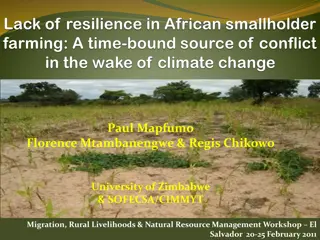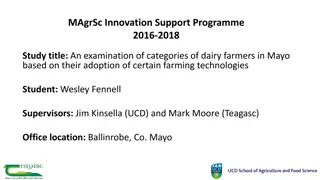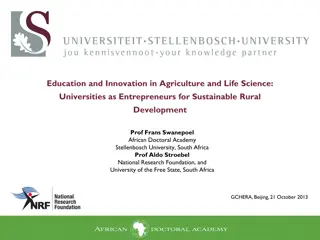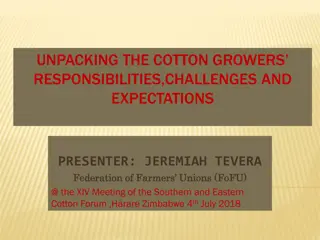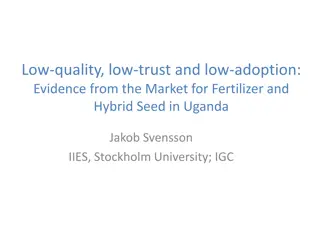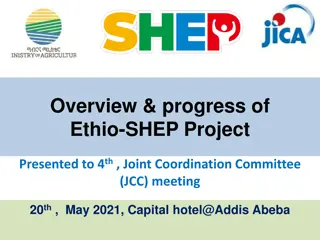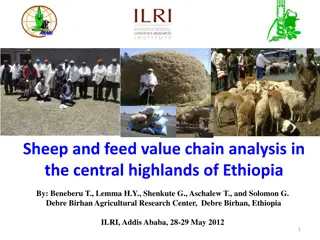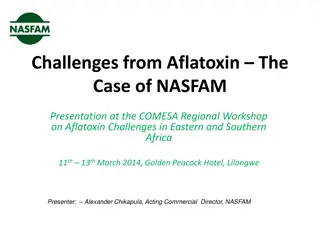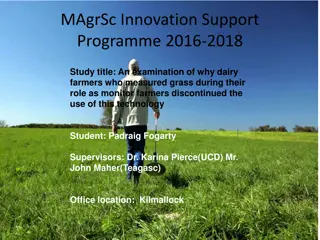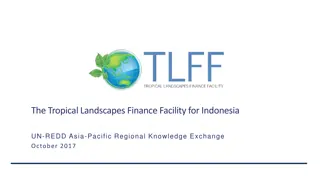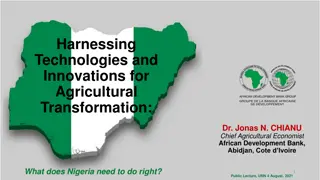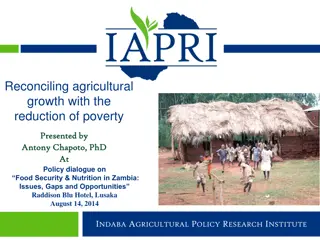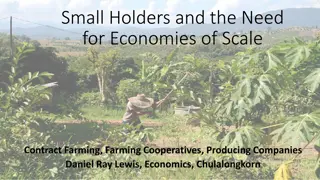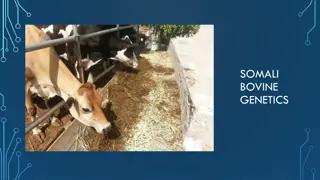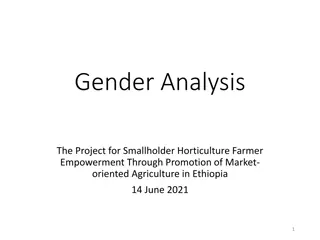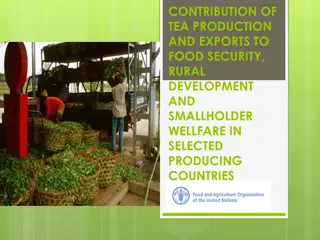Determinants of Maize Yield Variation in Zambian Smallholder Farming
Explore factors influencing maize productivity in Zambia, aiming to enhance smallholder agricultural efficiency. Investigate yield differences at distinct points using panel quantile regression. Objectives include assessing input profitability and strategies for boosting maize output.
0 views • 14 slides
Enhancing Livelihoods through FO4ACP Programme
Farmers Organizations for Africa, Caribbean and Pacific (FO4ACP) aims to uplift smallholders and family farmers in various countries by strengthening regional, national, and local farmers organizations. The program components include economic service provision, capacity building, policy influence, a
0 views • 11 slides
Understanding Credit Analysis for Farmers and Fishers
Credit analysis is crucial for farmers and fishers to access the right amount of credit at the right time. Economic feasibility tests such as returns on investment, repayment capacity, and risk-bearing ability are essential factors to evaluate credit worthiness. The 3Rs of credit - returns, repaymen
0 views • 30 slides
Implementing Sensitization Workshops for Agricultural Development
This content provides a detailed guide on conducting Sensitization Workshops for agricultural development, focusing on steps, objectives, and implementation methods. The workshops aim to raise awareness, empower farmers, and enhance skills for self-reliance. Key aspects covered include sharing goals
0 views • 13 slides
Empowering Farmers Through Market Surveys
The market survey methodology outlined in the content focuses on empowering farmers by increasing their understanding of market dynamics, building relationships with market players, and enhancing decision-making skills. It involves structured steps like sensitization workshops, crop selection, and i
1 views • 23 slides
Enterprise Zambia Challenge Fund - Supporting Sustainable Agriculture
Enterprise Zambia Challenge Fund, implemented by Self Help Africa with support from the European Union and the Government of Zambia, aims to integrate smallholder farmers into sustainable value chains in Zambia. The project provides economic, nutrition, and technical support to agri-enterprises, wit
0 views • 51 slides
Market-Led Approaches to Plant Breeding in Africa
Africa's agriculture is transitioning towards market-led systems, with smallholder farmers producing surpluses for growing demands. The focus is on quality, safety, and meeting market requirements to access expanding markets. Adoption of new crop varieties in Africa is around 35%, contrasting with h
0 views • 61 slides
The Populist Party's Fight for American Farmers
The Populist Party emerged as a champion for American farmers who were facing economic hardships such as low crop prices, increasing debt, and unfair railroad charges. Through the Grange organization, farmers demanded reforms like regulating railroads, implementing bimetallism, and advocating for po
1 views • 11 slides
Contract Farming in India: A Case Study of Potato Cultivation
Value addition in Indian agriculture is low due to poor processing levels. Contract farming is being considered to integrate agriculture production into the global value chain, but concerns about unequal bargaining power between farmers and corporations exist. Various forms of contract farming exist
0 views • 26 slides
Understanding Demonstration Farms and Their Objectives
Demonstration farms (DEMO farms) play a crucial role in showcasing improved agricultural practices to farmers. These farms are used to educate, share ideas, and demonstrate the benefits of new crop varieties and techniques. By promoting the use of innovative methods, DEMO farms aim to increase farme
1 views • 13 slides
Agriculture, Forestry, and Fisheries: State of the Nation Address 2018 Review
The Department of Agriculture, Forestry, and Fisheries presented insights into the state of the nation in 2018, focusing on the revitalization of the agriculture and agro-processing value chain. Key challenges discussed include land transfer, declining household involvement in agriculture, and input
0 views • 21 slides
Small-Scale Farmer Innovation and Agricultural Biodiversity in the Context of Intellectual Property
Discussions at the WIPO International Conference on IP and Innovation for Sustainable Agriculture highlighted the crucial role of small-scale farmers in managing and developing agricultural biodiversity, which is essential for sustainable agricultural production and global food security. The session
1 views • 12 slides
Challenges and Opportunities in the Indian Dairy Industry
The Indian dairy industry is characterized by the dominance of smallholder milk producers, with over 150 million farmers involved in production. Despite being the largest milk-producing country, India faces challenges such as low productivity of milch animals and the need for quality control mechani
0 views • 13 slides
Regional Project Proposal to Enhance Climate Resilience in Pakistan, Mongolia, and PRC
This proposal outlines a regional project focusing on enhancing climate resilience and agricultural productivity in Pakistan, Mongolia, and the People's Republic of China (PRC). The project aims to increase access to credit for smallholder farmers, promote climate-smart agriculture technologies, and
0 views • 12 slides
The Importance of Farmers in Our Food Supply Chain
Farmers play a crucial role in our food production, providing us with fruits, vegetables, dairy products, meat, eggs, grains, and more. They work tirelessly to grow crops, raise animals, and ensure a stable food supply for all. Different crops thrive in varying climates, from citrus fruits in warm r
1 views • 26 slides
Enhancing Agricultural Resilience and Livelihoods in Bhutan
The Kingdom of Bhutan Commercial Agriculture and Resilient Livelihoods Enhancement Programme (CARLEP) aims to increase smallholder farmers' incomes and reduce poverty through climate-resilient agricultural production. CARLEP builds on IFAD's longstanding partnership with the Royal Government of Bhut
1 views • 19 slides
IFAD-India Partnership: Enhancing Livelihoods and Empowerment
The IFAD-India cooperation has been instrumental in supporting rural development projects since 1979, focusing on empowering tribal communities, smallholder farmers, women, and youth. The evaluation of the country programme highlights the strategic objectives and innovative approaches implemented to
0 views • 21 slides
Supporting Baby Farmers in Legume Seed Production
This project, led by Vicki Morrone from Africa RISING-Outreach & Extension Center for Regional Food Systems, focuses on supporting small-scale farmers in producing legume seeds. The initiative aims to enhance agricultural practices among farmers to boost legume seed production. The project outlines
0 views • 4 slides
Overview of Cotton Production and Value Chain in Zimbabwe
Cotton production in Zimbabwe plays a crucial role in improving rural livelihoods and the economy. Over 200,000 smallholder farmers are engaged in cotton production, making it a significant source of income, employment, and export earnings. The cotton value chain involves various players like farmer
0 views • 13 slides
Recent Developments in Commodity Market Ecosystem and Global Competitiveness of Nigeria
The recent report from the last CMC meeting highlights the significance of developing the commodities market and the ecosystem's composition. It identifies multiple benefits of a thriving commodities market and discusses the evolution of commodity trading markets globally, continentally, and in Nige
0 views • 6 slides
Enhancing Climate Information Dissemination to Smallholder Farmers in Malawi and Tanzania
Lessons learned from the Global Framework for Climate Services (GFCS) on disseminating Climate Information Services (CIS) to smallholder farmers in Malawi and Tanzania highlighted the importance of multi-stakeholder partnerships in improving access to climate information. The advantages include a ho
0 views • 14 slides
Life on the Farm: Jobs and Responsibilities of Farmers
Farmers play a crucial role in growing food and caring for animals on farms worldwide. From feeding and cleaning animals to milking cows and collecting eggs, there are various tasks involved in farm life. Farmers also look after baby animals, herd sheep, and shear wool in addition to managing crops.
0 views • 19 slides
Understanding Farmer Organizations and Smallholder Farmers in Agroecology
Exploring various types of farmer organizations, their purposes, and impacts on smallholder farmers in agroecology. A discussion on organizational forms, interventions, challenges faced by smallholders, and the importance of collaboration in achieving collective benefits.
0 views • 15 slides
Enhancing Resilience in African Smallholder Farming: A Collaborative Approach
The project, led by the University of Zimbabwe in partnership with SOFECSA and the University of Wageningen, aims to address the lack of resilience in African smallholder farming to climate change pressures. Focused on sustainable food security and livelihoods in Southern Africa, initiatives such as
0 views • 31 slides
Analysis of Dairy Farmers' Technology Adoption in Mayo
Investigating the adoption of farming technologies by dairy farmers in Mayo, this study categorizes farmers based on adoption levels and factors influencing technology uptake. Through surveys and interviews, five categories of farmers were identified: Advanced, Progressive, Sustainable, Deliberate,
0 views • 11 slides
Transforming Agricultural Education in Africa for Sustainable Development
Agriculture plays a crucial role in SSA's economy, and transforming agricultural education is essential for sustainable rural development. The sector faces challenges such as population growth, climate change, and limited market access for smallholder farmers. To address these issues, there is a nee
0 views • 14 slides
Unpacking the Cotton Growers' Responsibilities, Challenges, and Expectations
In Zimbabwe, cotton cultivation by smallholder farmers plays a significant role in rural communities. The growers face challenges such as rising production costs, low productivity, and labor scarcity. They are responsible for complying with regulations, using inputs properly, and ensuring safety. Th
0 views • 10 slides
Addressing Low Adoption of Modern Agricultural Technologies in Uganda
Market failures are hindering the adoption of high-yielding seed varieties and fertilizers by smallholder farmers in Uganda. Research suggests various constraints such as lack of information, credit, and insurance. A hypothesis is proposed, questioning if the technologies are not adopted due to adul
0 views • 35 slides
Ethio-SHEP Project Overview and Progress Update
The Ethio-SHEP project aims to empower smallholder farmers in Amhara and Oromia Regions through market-oriented agriculture. Implemented by a joint team, the project focuses on capacity building, income generation, and effective extension services. Utilizing a four-step approach, the project has rea
0 views • 20 slides
Sheep and Feed Value Chain Analysis in the Central Highlands of Ethiopia
Smallholder farmers in the central highlands of Ethiopia rely on sheep for both subsistence and income generation. This study analyzed the sheep and feed value chain, identified market dynamics, and assessed constraints and opportunities. The research area, methodology, results, and key actors in th
0 views • 15 slides
Addressing the Challenges of Aflatoxin: The NASFAM Case Study
NASFAM, a smallholder farmers' association in Malawi, faces significant challenges with aflatoxin contamination impacting food security, trade, and market access. This presentation outlines NASFAM's history, the impact of aflatoxin on smallholders, trade implications, market regulations, and NASFAM'
0 views • 13 slides
Understanding Factors Influencing Dairy Farmers' Grass Measuring Technology Adoption
This study examines why dairy farmers who initially embraced grass measuring technology later discontinued its use. Through interviews and focus groups, reasons for discontinuation are compared with those who continue to use the technology. Recommendations include providing more support and resource
0 views • 9 slides
Tropical Landscapes Finance Facility - Leveraging Private Finance for Public Good
The Tropical Landscapes Finance Facility (TLFF) aims to address Indonesia's funding gap by mobilizing international capital markets to support projects benefiting smallholder farmers, rural electrification, and emissions reduction. TLFF offers long-tenor loans through green bonds and manages a grant
0 views • 13 slides
Leveraging Agricultural Technologies for Transformation in Nigeria
Emphasizing the importance of public investments, social coordination, and technology adoption, the lecture by Dr. Jonas N. Chianu highlights the need for scalability and collaborative knowledge production in agricultural innovation. It stresses the shift in mindset towards sustainable production pr
0 views • 36 slides
Reconciling Agricultural Growth with Poverty Reduction in Zambia
The presentation by Dr. Antony Chapoto at the Policy Dialogue on Food Security & Nutrition in Zambia highlighted the economic achievements, challenges, and opportunities for Zambia. Despite significant agricultural growth and GDP increase, persistent rural poverty remains a major concern, with 80% o
0 views • 34 slides
Enhancing Smallholder Farming Through Economies of Scale and Cooperative Models
Smallholder farming in developing countries is crucial for food production and the livelihoods of many individuals. However, to compete effectively in the market, small farms need to adopt cooperative models, economies of scale, and advanced agricultural technologies. By forming farming cooperatives
0 views • 8 slides
Somali Bovine Genetics: Enhancing Dairy Production in Somalia
Somali Bovine Genetics (SBG), established in 2015, leads in bovine genetics and artificial breeding technology in Somalia. They provide quality genetics and products, operate a semen distribution facility, and plan to set up a feed analysis lab and milk processing plant. SBG aims to impact smallhold
1 views • 9 slides
Understanding Gender Analysis in Smallholder Horticulture Farming Empowerment Project
The article discusses the concept of gender analysis within the context of a project aimed at empowering smallholder horticulture farmers in Ethiopia. It covers the differences between sex and gender, the purpose and methods of conducting gender analysis, and the utilization of its results. Practica
0 views • 24 slides
Committee Meetings on Development of Commodities Exchanges
The SEC.COMEX Ecosystem Committee has been actively discussing the history and development of commodities exchanges, focusing on stakeholders, infrastructural gaps, and market players. Key observations include the importance of smallholder farmers, warehousing integrity, and government involvement.
0 views • 4 slides
Tea Production and Exports Contributions to Food Security and Rural Development
Tea production and exports play a significant role in food security, rural development, and smallholder welfare in selected producing countries such as India, Kenya, and Sri Lanka. The earnings from tea exports contribute to income growth, foreign exchange, employment, and national economic growth.
0 views • 23 slides

